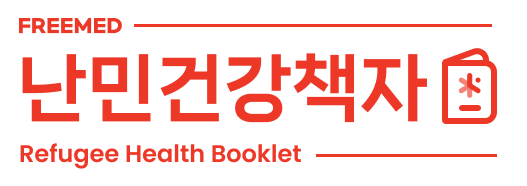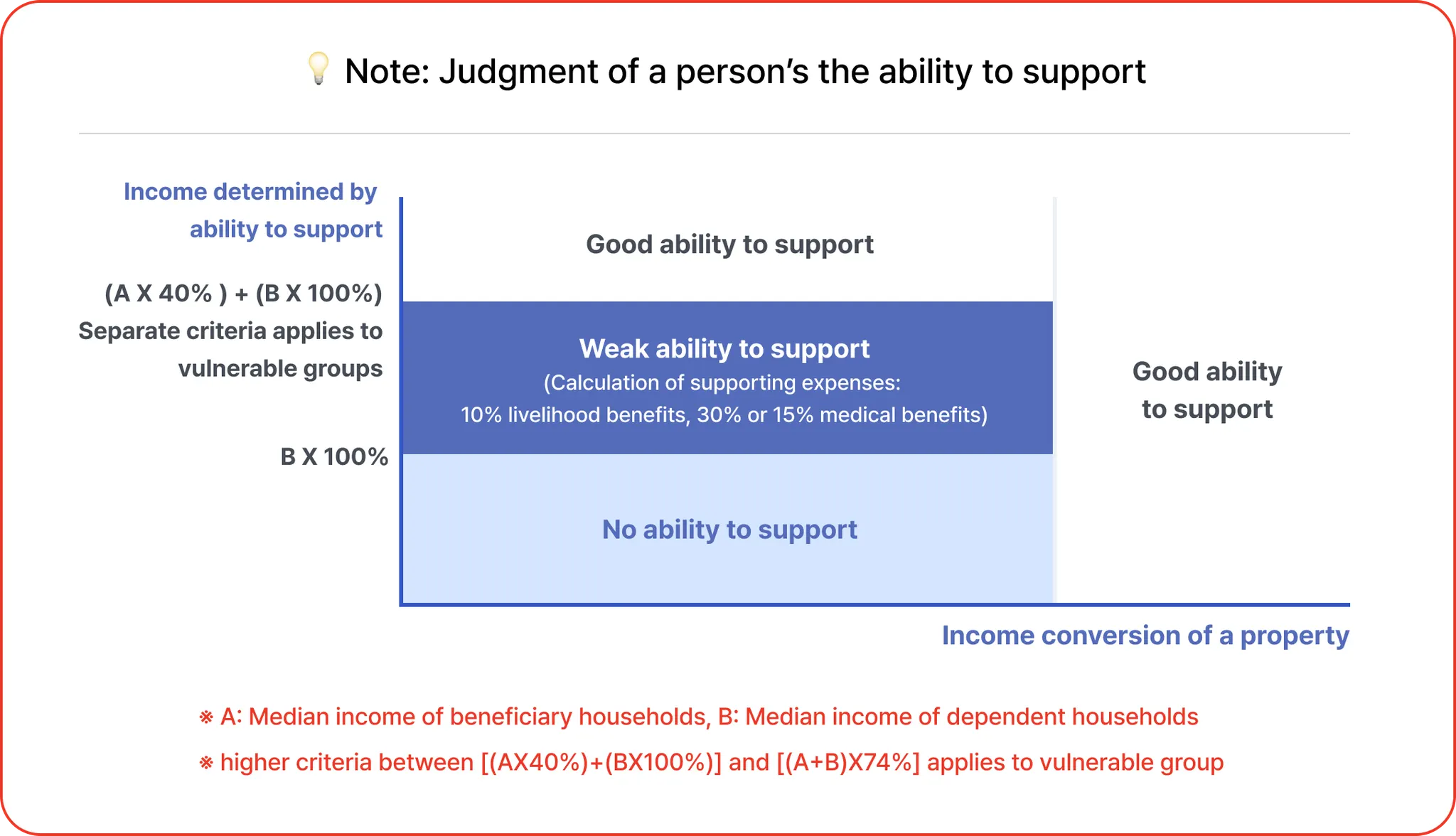National Basic Livelihood Security Act. - Eligibility Criteria
 What is National Basic Livelihood Security Act?
What is National Basic Livelihood Security Act?
It is a system in which the country guarantees basic living by providing living expenses, education expenses, medical expenses, etc. to people who have difficulty in a living, and provide systematic self-reliance support services to a person in a workable state so they can be self-reliant. Foreigners can also receive benefits according to this statute.
 Recipient
Recipient
You should be applicable foreigner in the case below and fulfill ①recognized income standard ②support obligor standard. 
[Immigration Act.] A person who has registered as a foreigner in accordance with Article 31 and corresponds to followings
•
A person who is married to a citizen of the Republic of Korea or whose spouse (also citizen of the Republic of Korea) is pregnant
•
A person who is married to a citizen of the Republic of Korea and nurturing minor whose nationality is the Republic of Korea.
•
A person who is sharing living or dwelling with spouse’s direct ascendant whose nationality is the Republic of Korea
•
A person who is divorce from the spouse (citizen of the Republic of Korea) or whose spouse has died and nurturing minor of Korean nationality or being pregnant with the fetus of the deceased spouse.
[Refugee Act.] A person recognized as a refugee by the ministry of Justice in accordance with Article 2
[Framework Act on the Treatment of Foreigners Residing in Korea] A foreigner residing in Korea as a person recognized by the Minister of Justice as a special Afghan donor pursuant to Article 14-2
① Recognized income level
A person whose Household income recognition amount (income valuation + property income conversion amount) is under selecting standard of beneficiaries by salary(constant ratio of Median income*)
※income valuation = (real income – expenditure by household characteristics – earned income deduction)
※property income conversion amount = [(property – basic number properties – liabilities) X income conversion amount]
[2025 standard median income] (Unit: Won)
Division \
Household size | 1 person household | 2 person household | 3 person household | 4 person household | 5 person household | 6 person household | 7 person
household |
Standard
Median income | 2,391,013 | 3,932,658 | 5,025,353 | 6,097,773 | 7,108,192 | 8,064,805 | 8,988,428 |
※Selecting standard by salary of 8 person or more household : for each increase in person, the difference between the 7 person household standard and the 6 person household standard is added to the 7 person household standard to calculate
※Standard median income of 8 person or more household : increases by 896,625₩ for each additional person(8 person household: 9,912,051₩)
[2025 selecting standard of beneficiaries by salary type] (Unit: Won)
Division \
Household size | 1 person household | 2 person household | 3 person household | 4 person household | 5 person household | 6 person household | 7 person
household |
Living benefit (32%) | 765,444 | 1,258,451 | 1,608,113 | 1,951,287 | 2,274,621 | 2,580,738 | 2,876,297 |
Medical benefit
(40%) | 956,805 | 1,573,063 | 2,010,141 | 2,439,109 | 2,843,277 | 3,225,922 | 3,595,371 |
Housing benefit
(48%) | 1,148,166 | 1,887,676 | 2,412,169 | 2,926,931 | 3,411,932 | 3,871,106 | - |
Educational benefit
(50%) | 1,196,007 | 1,966,329 | 2,512,677 | 3,048,887 | 3,554,096 | 4,032,403 | - |
※Housing benefit of 8 person or more household : increases by 295,559₩ for each additional person(8 person household: 3,171,856₩)
※Educational benefit of 8 person or more household : increases by 369,449₩ for each additional person(8 person household: 3,964,820₩)
② Support obligor criteria (applies only to medical benefits)
A person who don’t have a support obligor(a first-degree relative and his or her spouse), or who have a support obligor but he or she is unable to provide a support or cannot receive support
※Housing and educational benefits do not apply to the support obligor standard, and living benefits are excluded if the support obligor exceeds 100 million₩ in annual income or 900 million₩ in general assets
Support obligor | Support ability | Support obligor standard |
No Support obligor | Support obligor standard O | |
Have Support obligor | No Support ability | Support obligor standard O |
Have Support obligor | Weak Support ability | Support obligor standard △
(Select by the premise of dependency support) |
Have Support obligor | Have Support ability(inability to support, avoid etc.) | Support obligor standard O |
Have Support obligor | Have Support ability(implementation of support) |
 Determining support capability
Determining support capability
(Income property standard)
•
Have support ability: if the income determined by support ability of support obligor is more than the sum of 40% of A and 100% of B or the income conversion amount of property is more than 18% of the sum of A and B
•
Weak support ability: if the income determined by support ability of support obligor is more than 100% of B or less than the sum of 40% of A and 100% of B(separate standards apply to the elderly, the disabled, and support obligor), or the income conversation amount of property is less than the sum of 18% of A and B
•
No support ability: if the income determined by support ability of support obligor is less than 100% of B or the income conversion amount of property is less than 18% of the sum of A and B
 Exception
Exception
•
• if the household income of support obligor is less than 50% of the household median income standard of support obligor, and there is no member with the ability to work in household of support obligor, or if the property is limited to a house(including jeonse; lump-sum housing lease), special listing for property standard for support obligor is applied (A+B)×18% → (A+B)×40%
•
If the support obligor is a married daughter(including a daughter divorced or widowed from her spouse, or who is a single mother) or the biological mother of a married daughter, the standard below is applied
•
(Income standard) Even if the income of support obligor is correspond to ‘have’ support ability, it is considered as weak support ability
•
(Property standard) financial assets less than 200 million
 Application for support costs for those with insufficient support ability
Application for support costs for those with insufficient support ability
•
If you have marginal ability to support, on the premise of supporting allowance, we recognize you as having no capacity to support.
•
Supporting allowance = (Real income of support obligor – 100% of the median income based on a household of the support obligation) × Supporting allowance impose rate
•
(livelihood benefits) supporting allowance impose rate applies 10% (Medical benefits) supporting allowance impose rate is a differential application of 15% or 30% by the relationship of the beneficiaries and the support obligor.
 Cases where the support obligor is capable but support cannot be received
Cases where the support obligor is capable but support cannot be received
•
In the case of the support obligor is conscripted · drafted due to the military service law or emigrated, accommodated to the prison · detention center · treatment and custody facility.
•
When the support obligor avoids or refuses to support, such as when you can’t get emotional · financial support due to the loss of a normal family function because the family relations with the support obligor are dissolved.
•
When the head of the security agency confirms that the (qualified) recipient can’t receive the support.
 Abolishment of support obligor criteria
Abolishment of support obligor criteria
•
When the severely disabled such as benefits for the disabled pensioner are included in the household of the support obligor.
•
When the senior citizen on basic pension is included in the household of the support obligor.
•
When the (qualified) recipient is a single-parent household under 30 years old or the end of protection child.
CEO
Number
Address
Inquiry/Error Correction
Jiwon Choi
878-82-00340
120-833 Myeongmul-gil 76-5, Seodaemun-gu, Seoul, Room 103
refugee_health@freemed.or.kr
Copyright  2024 FREEMED All Rights Reserved
2024 FREEMED All Rights Reserved





